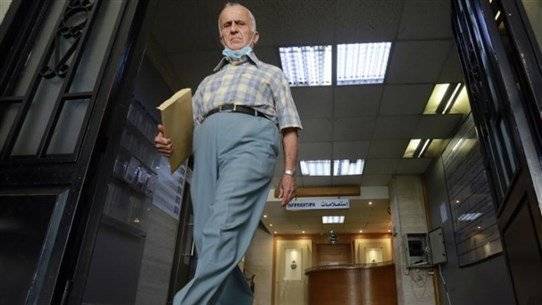The government has made its decision to suppress the open strike carried out by public sector employees through intimidating any employee who does not attend work for two days by referring them for disciplinary action and preventing them from receiving new parts of their salary, known as social assistance, transport fees, and motivational salary. This decision was made during a meeting held yesterday between Prime Minister Najib Mikati and the directors general, coordinated by the head of the Civil Service Council, Nasrine Mchmouchi. It was agreed to issue a circular stating that employees striking for 15 days would be considered resigned automatically. Additionally, it was also decided to enact a customs dollar in a manner deemed unconstitutional.
The government followed through on threats made in previous meetings held at the Grand Serail under the leadership of Prime Minister Najib Mikati and in the presence of the directors general, led by the head of the Civil Service Council, Nasrine Mchmouchi, approving a fragmented salary structure that requires employees to attend work to receive it, even though most parts are conditional and temporary. In return, it was also decided to raise the customs dollar through the issuance of an exceptional decree, which is also unconstitutional.
Public sector workers are threatened with disciplinary action if they do not attend work at least three days a week or face dismissal, being considered automatically resigned if they continue their absence for 15 consecutive days. This escalates the protest represented by the open strike to a second stage of conflict. The government is utilizing a handful of directors general who have decided to take the lead of labor unions in the public sector instead of the dismal absence of public worker associations, and have motivated them to exercise powers of discipline and dismissal against anyone who dares to continue the strike. The directors general are trading their loyalty to the government in exchange for being appointed to their positions or in hopes of potential promotions.
Thus, Mikati, the governmental ministers, and the directors general are placing employees before a choice of two options: accept an unjust offer or face disciplinary actions and the loss of their jobs. According to the meeting's outcome yesterday, it was agreed to split salaries as follows: a basic salary, financial assistance equivalent to a full salary, a daily transport fee of 95,000 Lira conditional on at least two days of attendance, and "production compensation" or "motivational salary" for each actual day present at public administration work places and the State Employees' Cooperative for the months of August and September. The so-called "motivational salary" is also fragmented, starting from 150,000 Lira for fifth-category employees and their equivalents among contractors, workers, and service providers, with a maximum of 350,000 Lira for first-category employees. This last salary, along with social assistance and transport fees, is naturally contingent upon the employee attending their workplace at least three days.
Mikati and the ministers have tasked the directors general with taking administrative and disciplinary measures, including referral to the Central Inspection Authority and the High Disciplinary Authority, against any employees who do not attend work without legal justification for at least two days, and applying the provisions of the Employees' Law against those who are absent without justification for 15 days, in which case they will be considered resigned from service, and requesting the Central Inspection to monitor all relevant parties to implement these measures.
However, Mikati and his ministers did not stop there; they exploited this proposition to implement the customs dollar. According to sources from "Al-Akhbar," there was discussion about seizing the opportunity to approve the customs dollar at a black market rate and issue the decision via a decree relying on the formula of "exceptional approval." This means that taxes will be imposed while public sector workers will only receive a motivational salary for two months.
According to former Interior Minister and legal expert Ziad Baroud, exceptional approval "does not exist in the Lebanese constitution under any title, as it transfers the powers of the Cabinet and restricts them in the hands of the President of the Republic and the government, in complete absence of any text that justifies or provides any legal support for that." This action does not constitute a precedent, as decisions under this title have been published in the official gazette for many years, and each time the justification was to avoid paralysis amid a caretaker government. Today, "they may justify it under exceptional circumstances and emergencies, but it remains unconstitutional," Baroud asserts.
As a result of this decision, the government is throwing crumbs to the employees while benefitting from increased taxes, placing a heavy burden on all consumer segments without a clear plan to exit the ongoing crisis regarding the issue of loss distribution for the past three years. In light of burden distribution, society is being charged costs beyond its capacity while the government's only concern is to halt the rebellious behavior of the public sector workers demanding a fair correction of their wages.
Nawal Nasr, head of the Public Administration Employees Association, commented on this decision saying: "It is a threat that will not pass. We are the ones who threaten the government and the state, not the other way around. We are rightful claimants, while it is neglectful of its duties towards us." Employees understand that the directors general have the unilateral authority to implement actions, and they have no choice but to confront, fortified by a rights-based discourse, as Nasr insists that "there can be no servitude after three years of crisis," advising officials to resolve matters before resorting to international institutions concerned with human and labor rights.
Estimates indicate that around 80% of public sector employees belong to the fourth and fifth categories, meaning their salaries do not exceed two million Lira. Thus, under Mikati and the directors general's proposal, they will receive a maximum of 150 or 200 thousand Lira for each day of attendance and social assistance equal to their salary, which will allow them to cover transport costs to and from work only, especially for those residing in remote areas.




